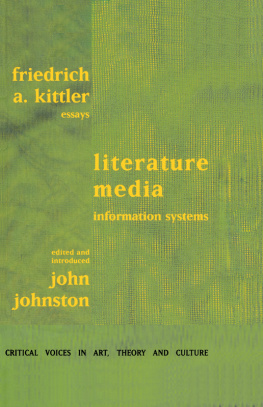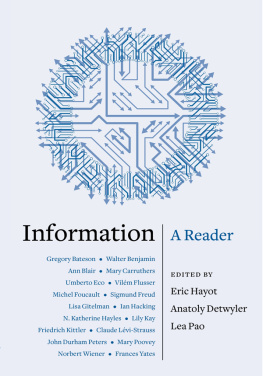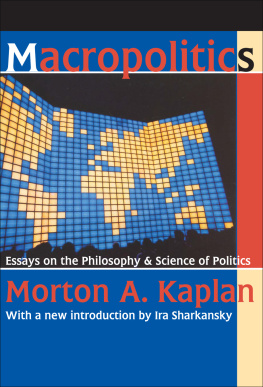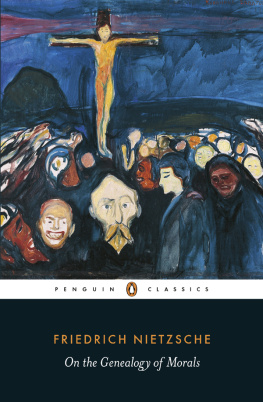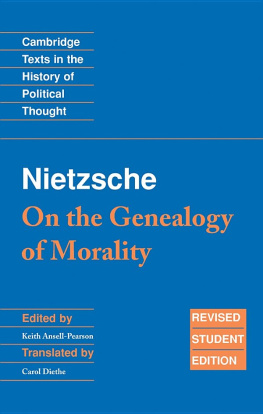Stanford University Press
Stanford, California
English translation 2013 by the Board of Trustees of the Leland Stanford Junior University. All rights reserved.
The Truth of the Technological World was originally published in German in 2013 under the title Die Wahrheit der technischen Welt Suhrkamp Verlag Berlin 2013.
This book has been published with the assistance

of the Hubert Burda Stiftung.
No part of this book may be reproduced or transmitted in any form or by any means, electronic or mechanical, including photocopying and recording, or in any information storage or retrieval system without the prior written permission of Stanford University Press.
Library of Congress Cataloging-in-Publication Data
Kittler, Friedrich A., author.
[Wahrheit der technischen Welt. English]
The truth of the technological world : essays on the genealogy of presence / Friedrich A. Kittler ; [edited and] with an afterword by Hans Ulrich Gumbrecht ; translated by Erik Butler
p. cm.
Originally published in German in 2013 under the title Die Wahrheit der technischen Welt.
A collection of twenty-three essays which appeared between 1978 and 2010.
Includes bibliographical references.
ISBN 978-0-8047-9068-0 (cloth : alk. paper)
ISBN 978-0-8047-9254-7 (pbk. : alk. paper)
1. Communication and technologyPhilosophy. 2. LiteratureHistory and criticism. 3. CommunicationPhilosophy. 4. TechnologyPhilosophy. I. Gumbrecht, Hans Ulrich, editor of compilation. II. Title.
P96.T42K584 2014
302.23dc23
2014010076
ISBN 978-0-8047-9262-2 (electronic)
Printed in the United States of America on acid-free, archival-quality paper.
Typeset at Stanford University Press in 10/14 Minion.
The TRUTH of the TECHNOLOGICAL WORLD
Essays on the Genealogy of Presence
FRIEDRICH A. KITTLER
With an Afterword by Hans Ulrich Gumbrecht
Translated by Erik Butler
STANFORD UNIVERSITY PRESS
Stanford, California
Contents
Poet, Mother, Child: On the Romantic Invention of Sexuality
The Middle Ages had something called the Clan. Since the eighteenth century, the code for kinship has been called the Family. Clans were connected by the law of exogamy, which linked them and inscribed scions along the axes of generations and races [Geschlechter]. Families, on the other hand, introject norms and imagoes into offspring,
When Parzival is born, Wolfram von Eschenbach simply mentions that his mother and her ladies-in-waiting spread the legs of the infant. When they discern the visseln (which translates into todays English as willie), they lavish affection on the child. Coded in terms of a figure running this way and thatwhich Freud took up to his own ends and confused with natural fact.
Instead of promoting the play of metaphor, Herzeloyde, out of love and fear, haunt the hero and open the way for psychology or psychoanalysis. The incestuous double bond vanishes without consequence.
The code governing the conjugal, nuclear familywhich emerged in the seventeenth and eighteenth centuries in the intellectual bourgeoisie and became universal in the nineteenthstands opposed to the code of the clan on every point. Now political, juridical, and economic power are no longer linked to kinship structures. The household becomes the family unit, which assumes all tasks of socializing a small number of childrenwho, moreover, are planned. Burdened with the responsibility of being more symbolic than ever, the biological father surrenders his preeminent position to the mother. She, in turn, as the new center of the family, takes the place of the nurses of old. (Paradoxically, then, an origin substitutes for a replacement.) Intimacy and education tie the few children in the family to parent imagoes and eclipse the law of exogamy (which Freud interpreted as incestuous itself, if by transference). In order to be ableindeed, in order to wishto become mothers or fathers, Lessings virgins dream of a Father and Goethes youths dream of a Mother. The phantasm of the Family obscures exchange that occurs between many families (which culturalizes them).
In the process, infantile sexualitywhich previously was just as public as it was unexaminedbecomes worthy of mention in the first place. The nuclear family becomes a complex relay that produces the childrens mobile and fragmentary sexualities through records [Aufschreiben] made from the standpoint of the conjugal norm. The separation between parents and the world of childhood enables loving mothers and fathers, pedagogues, and psychologists to store the childrens declarations of love to the authors of their days. There results, especially for mothers, a microhistorical archive that drills family romances into children as their own experiences. Children become individuals who interpretinstead of the accidents of birth and racedevelopments and origins within themselves according to the rules of reflection and hermeneutics.
This couplingof sexuality that derives from cultural coding and of speech that, when it involves self-declaration and self-interpretation, goes by the name of poetryis to be investigated by means of discourse analysis. Neither social psychology, which presupposes that the discourses in question have already emerged, nor psychoanalysis, which presupposes the sexualization of children, can analyze how such a link (and nothing else) is bound to texts (and nothing else). In terms of discourse analysis, Romantic poetry is the effect of a semiotechnics that made the conjugal family matrilineal around 1800. The recoding itself was enacted by Novaliss novel, Heinrich von Ofterdingen; the effects were articulated in the works of Clemens Brentano, Friedrich Schlegel, Ludwig Tieck, Achim von Arnim, and E.T.A. Hoffmann.
1. Matrilineal Recoding
Klingsohrs tale [Mrchen] has the function of symbolizing the primary socialization that Heinrichs mother was supposed to narrate at the end of the novel. of the Oedipus complex.
Thereby, the bourgeois family obeys a mandate. It must take over the task of cultural reproduction, for the era of dynastic alliances has come to an end. The bourgeois family unit occupies a position between an afamilial and barren underworld of archaic mothers, on the one hand, and a heavenly dynasty that has grown sterile, on the other. Dynasties do not produce; they combine: stars and figuressigns and signs. This play of alliances comes to a halt as soon as Arcturus, who cannot be king alone (308f.), loses his wife to the bourgeois family and his only daughterfor whom he cannot find a husband of equal birth (cf. 214f.)to the slumber of death. The order of alliance literally falls apart in its hypergamy: to make known and put an end to Freyas unredeemed status, the ancient hero (a symbolic father) must break the phallic sword of the dynasty.
The end of the law that codifies bodies as signs and punishes transgressions of the code by the sword inaugurates the norm that sexualizes children and makes them into individuals. The bourgeois family does not combine and distribute signs. Instead, it produces: children and imagoes. What is at first a nuclear familythe Father, the Mother, and their son, Erosis augmented by Sophia, who comes from heaven, the Scribe or Death (303), Ginnistan or Fantasy, and little Fable, whom the Father sires with Ginnistan. Initially, Ginnistan is only a nursemaid for the Son, who makes up for the Mothers lack of milk. Soon, howeverand to put matters in Freudian termsshe becomes sensuality [Sinnlichkeit], to which the Mother opposes interiority [Innerlichkeit] and familial cohesion. Familial eroticism, that is, plays out between the weakness [
Next page

